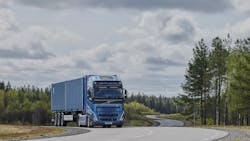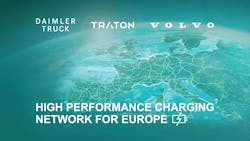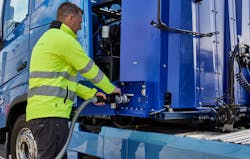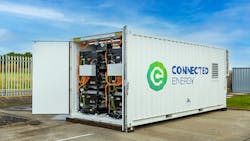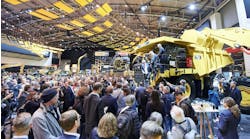During Volvo Group's 2022 Capital Markets Day, held June 22, president and CEO Martin Lundstedt and various members of the group's management team outlined the opportunities it sees in the continued technology shift occurring in the heavy-duty truck and construction equipment markets. The company foresees these opportunities helping to accelerate sales growth in the coming years.
Electrification is one of the key technology shifts Volvo sees shaping the industries it serves. The company expects a higher value to be placed on electric vehicles and equipment as customers become interested in them which will help to accelerate growth.
READ MORE: Electric Vehicle Development to Grow Over Next Decade
"Climate change is the challenge of our generation. At the same time, demand for transport and infrastructure continues to grow and we must meet this demand with more sustainable solutions. In this changing landscape, we can lead the transformation and provide increased value for our customers and embark the Volvo Group on a growth journey driven by electrification, autonomous solutions and new productivity services. We are geared for growth," said Lundstedt in Volvo's press release discussing its Capital Markets Day.
As Volvo sees the value in electric powered machines and other advanced technologies such as automation—both from a business perspective and industry/societal one—it is continually researching and developing in these areas.
Volvo Testing Hydrogen-Powered Vehicles
Expanding on its electric vehicle portfolio, Volvo has begun testing two hydrogen fuel cell powered vehicles—a truck and an articulated hauler.
Hydrogen is seen as a beneficial option for many applications because only water vapor is emitted and it can provide longer run times. The Volvo hydrogen truck, for instance, has a range of 1,000 km (621.4 mi.) before refueling is required which is comparable to that of diesel.
"Hydrogen-powered fuel cell electric trucks will be especially suitable for long distances and heavy, energy-demanding assignments. They could also be an option in countries where battery charging possibilities are limited," said Roger Alm, president of Volvo Trucks, in the company's press release announcing testing of the hydrogen truck.
In addition, many believe hydrogen is better able to meet the power density required for heavier duty applications. One of the challenges associated with electrifying larger mobile equipment is the battery size needed which is costly and possibly prohibitive to the weight of the vehicle. Hydrogen, however, can provide the power needed for these large vehicles without adding too much weight.
Refueling of hydrogen powered vehicles is quick, as well. Volvo noted in its press release that the truck can be refueled in less than 15 minutes. Recharging battery-electric vehicles is often much longer.
Fuel cells for the Volvo Trucks hydrogen vehicle are provided by cellcentric, the joint venture formed by Volvo Group and Daimler Truck AG to help advance hydrogen technology for heavy vehicles. Though competitors, the companies also see the value to bring their expertise together in order to advance the industry and bring necessary solutions to market.
Volvo Trucks plans to have its hydrogen fueled vehicle available to the market by the end of the decade.
Volvo Construction Equipment (Volvo CE) is testing its fuel cell articulated hauler prototype, the Volvo HX04, as part of a research project begun in 2018 and scheduled to conclude in 2022. From this testing the company will use the findings to aid future developments.
"While an early prototype, this innovation will give valuable insights into the opportunities of hydrogen in the energy transformation alongside battery-electric solutions. We believe that by exploring multiple technologies and working in partnership we can create the best path forward to decarbonize the construction industry," said Carolina Diez Ferrer, head of Advanced Engineering Programs at Volvo CE, in the company's press release announcing testing of the HX04.
For this project, Volvo CE said it partnered with RISE Research Institutes of Sweden for development of the driveline and safety systems as well as fuel cell developer PowerCell Sweden.
Volvo CE explained in its press release that a fuel cell works much like a battery except that it generates its own electricity from the hydrogen onboard as needed rather than being charged from an external source. It also noted the uptime, range and fueling of fuel cells is similar to that of combustion engines which will be beneficial for many customers.
According to Volvo CE, the HX04 can be refueled in about 7.5 min. and provide 4 hr. of operation.
Infrastructure Remains a Challenge
One of the largest hurdles to the uptake of battery-electric and hydrogen powered vehicles is the infrastructure necessary to recharge and refuel them. While there has been growth in this area, more development is needed around the world.
Volvo is among the companies working to aid these development efforts. Volvo Group is a founding member of H2Accelerate, a group of companies collaborating to advance development of hydrogen trucks in Europe. Shell, another member of the group, has installed a hydrogen refueling station at Volvo CE's test track where it is testing the HX04.
As a fuel company, Shell understands the need to expand into other fuel options to best serve evolving market requirements. The company has been involved in many research projects involving alternative fuels such as those made from algae.
"Providing the fueling infrastructure for this innovative project gave Shell the opportunity to demonstrate our technical capabilities in hydrogen, and enabled us to support one of our key global collaboration partners in taking another step forward in their decarbonization journey, which goes to the heart and intent of Shell’s Powering Progress strategy," said Oliver Bishop, Shell’s general manager for Hydrogen Mobility, in Volvo CE's press release.In Europe, Volvo Group has also formed a joint venture (JV) with Daimler Truck and TRATON GROUP to develop charging infrastructure. The companies announced on July 8 the completion of final steps for the formation of their joint venture. Through this partnership, the companies plan to install and operate at least 1,7000 high-performance green energy charge points stated Volvo in its press release announcing the JV update.
Learn more about the JV at its website.
Charging stations will be placed close to highways as well as logistics hubs around Europe. By working together, the companies can help to assure charging infrastructure is available for the growing number of electric trucks on roadways in the region. All three companies are heavily invested in development of electric vehicles, and see the benefit of working together to help meet charging infrastructure needs.
"This is a long-awaited and major step towards achieving the required charging infrastructure for the roll-out and success of battery-electric long-haul trucks and coaches. We are making what would be impossible for one actor alone to accomplish - this strong partnership is a significant milestone and accelerator towards carbon neutral transport in Europe by 2050," said Lundstedt in the company's press release announcing the JV update.
READ MORE: Top 10 Trends Impacting Construction in North America
In addition to the need for more refueling infrastructure, production of green hydrogen is also necessary. There are many ways hydrogen can be produced, some of which are considered more environmentally friendly than others. Green hydrogen is produced using renewable energy sources such as wind or solar power. Reducing the carbon footprint of hydrogen production helps to ensure a truly "clean" power system alternative.
"We expect the supply of green hydrogen to increase significantly during the next couple of years, since many industries will depend on it to reduce CO2. However, we cannot wait to decarbonize transport, we are already running late. So, my clear message to all transport companies is to start the journey today with battery electric, biogas and the other options available. The fuel cell trucks will then be an important complement for longer and heavier transports in a few years from now," said Alm.
Volvo Energy Invests in Second Life Batteries
Battery technology is also questioned about how truly clean it is. While batteries help provide zero-emissions operation of vehicles and equipment, how they are made and what happens once past their useful life poses challenges. This second aspect is an area in which Volvo, and many other companies, has invested.
Volvo Energy—a Volvo Group business area focused on batteries—has invested in Connected Energy, a UK-based company developing second-life battery energy storage solutions.
Although batteries currently have about a 10-year lifespan for use in powering vehicles, they still contain enough energy to be used in other applications, giving them a second life. Energy storage for grids and other applications are among those which many see as a way to continue using batteries.
This helps to keep them out of landfills and aid with the energy storage needs that will be required as more vehicles transition to electric power.
"There is a great deal of untapped potential in the second-life use of batteries. This forward-leaning investment aims to facilitate the scaling-up of second-life battery energy storage systems and further secure circular business opportunities for the forthcoming ramp-up in Volvo Group’s second-life battery returns," said Joachim Rosenberg, president, Volvo Energy, in the company's press release announcing the investment. "Together with Connected Energy, we will minimize the environmental impact of the batteries that has powered Volvo Group vehicles. By repurposing the batteries, we obtain the full value from them – from a climate, environment and business perspective."

